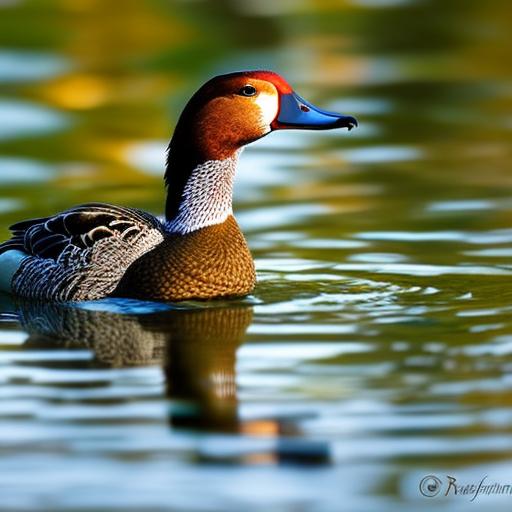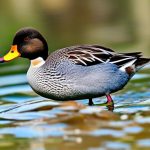Heritage duck breeds are traditional breeds of ducks that have been raised for centuries and have a long history of being bred for specific traits and purposes. These breeds are often considered to be the original or “pure” breeds of ducks, as they have not been heavily crossbred or genetically modified like many commercial duck breeds. Heritage duck breeds are known for their unique characteristics, including their physical appearance, behavior, and ability to thrive in various environments.
The history of heritage duck breeds dates back hundreds of years, with some breeds originating in Asia and others in Europe. These ducks were bred for specific purposes, such as meat production, egg laying, or hunting. Over time, as industrial agriculture became more prevalent, many heritage duck breeds were replaced by commercial varieties that were bred for higher productivity and faster growth. However, there has been a recent resurgence of interest in heritage duck breeds due to their unique qualities and the desire to preserve these traditional breeds.
Key Takeaways
- Heritage duck breeds are traditional breeds that have been around for centuries and are not commonly found in commercial agriculture.
- Preserving heritage duck breeds is important for maintaining genetic diversity and preventing the loss of valuable traits.
- Heritage duck breeds have unique characteristics and traits, such as hardiness, foraging ability, and flavorful meat.
- Popular heritage duck breeds include the Pekin, Muscovy, and Rouen, each with their own distinct features.
- Raising heritage duck breeds can contribute to sustainable agriculture by promoting biodiversity and reducing reliance on industrial farming practices.
The Importance of Preserving Heritage Duck Breeds
Preserving heritage duck breeds is important for several reasons. First and foremost, these breeds represent a valuable genetic resource that can be used to improve the overall health and diversity of duck populations. By preserving these traditional breeds, we ensure that their unique genetic traits are not lost forever.
Additionally, heritage duck breeds often possess traits that make them well-suited to specific environments or farming systems. For example, some heritage duck breeds are known for their ability to forage and thrive in free-range or pasture-based systems. By preserving these breeds, we can continue to benefit from their natural abilities and adaptability.
Furthermore, heritage duck breeds have cultural and historical significance. They are a part of our agricultural heritage and represent the traditions and practices of past generations. Preserving these breeds helps to maintain our connection to the past and ensures that future generations can learn from and appreciate the knowledge and skills of our ancestors.
Despite their importance, heritage duck breeds face several threats. One of the main threats is the loss of genetic diversity due to the dominance of commercial duck breeds. As commercial breeds become more prevalent, there is a risk that the genetic traits and characteristics of heritage breeds will be lost. Additionally, habitat loss and changes in farming practices can also pose a threat to heritage duck breeds, as they may no longer have suitable environments in which to thrive.
Characteristics and Traits of Heritage Duck Breeds
Heritage duck breeds exhibit a wide range of physical characteristics and behavioral traits. In terms of physical appearance, heritage ducks can vary greatly in size, shape, and coloration. Some breeds, such as the Pekin duck, are large and muscular with white feathers, while others, like the Indian Runner duck, are slender and have a unique upright posture. There are also heritage duck breeds with striking color patterns, such as the Cayuga duck with its iridescent black feathers or the Rouen duck with its vibrant green head.
In addition to their physical characteristics, heritage duck breeds also have distinct behavioral traits. For example, some breeds are known for their calm and docile nature, making them easier to handle and manage. Others may be more active and curious, constantly exploring their surroundings. These behavioral traits can make heritage ducks not only interesting to observe but also valuable for specific farming purposes. For example, ducks with a strong foraging instinct can help control pests in agricultural fields or orchards.
Popular Heritage Duck Breeds and Their Unique Features
There are several popular heritage duck breeds that are known for their unique features and characteristics. One such breed is the Pekin duck, which is one of the most common commercial duck breeds but also has a long history as a heritage breed. Pekin ducks are large and muscular with white feathers and orange bills and feet. They are known for their fast growth rate and are often raised for meat production.
Another popular heritage duck breed is the Indian Runner duck. This breed is known for its distinctive upright posture and slender body shape. Indian Runner ducks come in a variety of colors, including white, black, and fawn. They are excellent foragers and are often used in organic farming systems to control pests and weeds.
The Cayuga duck is another heritage breed that stands out for its unique features. This breed has beautiful iridescent black feathers that can appear green or purple in certain lighting conditions. Cayuga ducks are known for their calm and friendly nature, making them popular as pets or for exhibition purposes.
The Role of Heritage Duck Breeds in Sustainable Agriculture
Heritage duck breeds play a crucial role in sustainable agriculture. One of the main ways they contribute is through their ability to forage and thrive in free-range or pasture-based systems. Unlike commercial duck breeds that are often raised in confinement, heritage ducks have a natural instinct to search for food and can graze on grasses, insects, and other natural resources. This not only reduces the need for supplemental feed but also helps to control pests and weeds in agricultural fields.
Furthermore, heritage duck breeds can help improve soil health through their grazing habits. As they forage, ducks naturally fertilize the soil with their droppings, which adds nutrients and organic matter to the land. This can help improve soil structure, increase water-holding capacity, and promote overall soil health.
In addition to their role in sustainable agriculture, heritage duck breeds also contribute to biodiversity conservation. By preserving these traditional breeds, we ensure that a wide range of genetic traits and characteristics are maintained within the duck population. This genetic diversity is important for the long-term resilience of duck populations and can help them adapt to changing environmental conditions.
The Benefits of Raising Heritage Duck Breeds for Meat and Eggs

Raising heritage duck breeds for meat and eggs offers several benefits. First and foremost, heritage duck meat is known for its exceptional flavor and tenderness. The ducks are typically raised on a natural diet and have more time to develop their muscles, resulting in meat that is rich in flavor and has a melt-in-your-mouth texture. Additionally, heritage duck meat is often leaner and has a higher proportion of healthy fats compared to commercial varieties.
Similarly, heritage duck eggs are prized for their rich flavor and vibrant yolks. The ducks are typically allowed to roam and forage, which results in eggs that have a more robust flavor and a deeper yellow or orange color. Heritage duck eggs are also known for their larger size compared to chicken eggs, making them a popular choice for baking or cooking.
It is also worth noting that heritage duck meat and eggs differ from commercial varieties in terms of production methods. Commercial duck production often involves intensive confinement systems, where ducks are raised in large numbers in small spaces. This can lead to issues such as overcrowding, stress, and the need for antibiotics or other medications. In contrast, heritage ducks are typically raised in more natural and humane conditions, with access to outdoor space and the ability to exhibit natural behaviors.
The Challenges of Breeding and Raising Heritage Duck Breeds
Breeding and raising heritage duck breeds can come with its own set of challenges. One of the main challenges faced by breeders is the limited availability of breeding stock. Many heritage duck breeds have small populations, making it difficult to find quality breeding birds. This can lead to inbreeding and a loss of genetic diversity if not managed carefully.
Another challenge is the lack of knowledge and resources available for breeding and raising heritage ducks. Unlike commercial breeds, which have extensive documentation and support from agricultural organizations, heritage breeds often have limited information available. This can make it more challenging for breeders to learn about best practices for breeding, feeding, and managing the health of their ducks.
Additionally, heritage duck breeds may have different nutritional requirements or health issues compared to commercial varieties. Breeders and farmers need to be aware of these differences and ensure that they are providing the appropriate diet and healthcare for their ducks. This may require additional research or consultation with experts in heritage duck breeds.
Despite these challenges, there are several tips for overcoming them. One tip is to network with other breeders and farmers who have experience with heritage duck breeds. They can provide valuable advice and support, as well as potential sources for breeding stock. Additionally, joining breed-specific organizations or online forums can provide access to resources and information about heritage duck breeds. Finally, it is important to prioritize genetic diversity when breeding heritage ducks. This can be achieved by carefully selecting breeding pairs and avoiding excessive inbreeding.
Heritage Duck Breeds in Danger of Extinction: How You Can Help
Unfortunately, many heritage duck breeds are in danger of extinction due to a variety of factors. Some breeds have small populations and are at risk of genetic loss or inbreeding depression. Others are threatened by habitat loss or changes in farming practices that no longer support their unique needs.
To help preserve heritage duck breeds, there are several actions that individuals can take. One way to support preservation efforts is by purchasing and raising heritage ducks yourself. By doing so, you not only contribute to the conservation of these breeds but also have the opportunity to experience their unique qualities firsthand.
Another way to help is by supporting organizations and initiatives that focus on the preservation of heritage duck breeds. These organizations often provide resources, education, and networking opportunities for breeders and farmers interested in heritage ducks. Additionally, they may have breeding programs or conservation projects aimed at maintaining genetic diversity within specific breeds.
Finally, spreading awareness about the importance of heritage duck breeds is crucial. By sharing information with others and educating them about the value of these breeds, we can help generate support and interest in their preservation. This can be done through social media, community events, or by simply having conversations with others who may be interested in sustainable agriculture or heritage breeds.
Resources for Learning More About Heritage Duck Breeds
For those interested in learning more about heritage duck breeds, there are several resources available. Books such as “Storey’s Guide to Raising Ducks” by Dave Holderread and “The Small-Scale Poultry Flock” by Harvey Ussery provide comprehensive information on raising ducks, including heritage breeds.
Websites such as the Livestock Conservancy (livestockconservancy.org) and the American Poultry Association (americanpoultryassociation.com) also offer valuable information on heritage duck breeds, including breed descriptions, breeding guidelines, and conservation efforts.
Additionally, there are several organizations dedicated to the preservation of heritage duck breeds. The Livestock Conservancy and the American Poultry Association are two such organizations that provide resources and support for breeders and farmers interested in heritage ducks.
Why Heritage Duck Breeds Matter for the Future of Agriculture
In conclusion, heritage duck breeds play a vital role in sustainable agriculture and the preservation of our agricultural heritage. These traditional breeds possess unique characteristics and traits that make them valuable for a variety of purposes, including meat production, egg laying, pest control, and soil health improvement.
Preserving heritage duck breeds is important for maintaining genetic diversity within duck populations and ensuring the long-term resilience of these animals. Additionally, heritage ducks have cultural and historical significance, representing the traditions and practices of past generations.
By supporting the preservation of heritage duck breeds through breeding, raising, and spreading awareness, we can help ensure that these valuable genetic resources are not lost forever. Whether you are a farmer, a backyard enthusiast, or simply someone interested in sustainable agriculture, there are many ways to get involved and make a difference in the preservation of heritage duck breeds.
If you’re interested in heritage duck breeds, you might also want to check out this informative article on “When Do Guinea Fowl Lay Eggs?” It provides valuable insights into the breeding and egg-laying habits of guinea fowl, which can be a fascinating addition to any poultry enthusiast’s flock. To learn more about this topic, click here. Additionally, if you’re looking for a reliable chicken coop option, the “Producers Pride Sentinel Chicken Coop” is worth considering. This article highlights the features and benefits of this coop, ensuring your chickens have a safe and comfortable home. Find out more about the Producers Pride Sentinel Chicken Coop by clicking here. Lastly, if you’re in need of a portable chicken coop solution, the “Chicken Coop Portage” article offers insights into this convenient option. Discover the advantages of a portable coop by clicking here.
FAQs
What are heritage duck breeds?
Heritage duck breeds are breeds of ducks that have been around for a long time and have been selectively bred for certain traits. They are often raised for meat, eggs, or as ornamental birds.
What are some examples of heritage duck breeds?
Some examples of heritage duck breeds include the Pekin, Muscovy, Rouen, and Cayuga.
What makes heritage duck breeds different from other duck breeds?
Heritage duck breeds are different from other duck breeds because they have been selectively bred for certain traits over a long period of time. They are often hardier and more adaptable to different environments than other duck breeds.
What are some benefits of raising heritage duck breeds?
Some benefits of raising heritage duck breeds include their hardiness, adaptability, and the fact that they are often more flavorful than other duck breeds. They are also often better suited to free-range or pasture-based systems.
Are heritage duck breeds endangered?
Yes, many heritage duck breeds are endangered due to the rise of industrial agriculture and the decline of small-scale farming. It is important to preserve these breeds for their genetic diversity and cultural significance.
Meet Walter, the feathered-friend fanatic of Florida! Nestled in the sunshine state, Walter struts through life with his feathered companions, clucking his way to happiness. With a coop that’s fancier than a five-star hotel, he’s the Don Juan of the chicken world. When he’s not teaching his hens to do the cha-cha, you’ll find him in a heated debate with his prized rooster, Sir Clucks-a-Lot. Walter’s poultry passion is no yolk; he’s the sunny-side-up guy you never knew you needed in your flock of friends!







